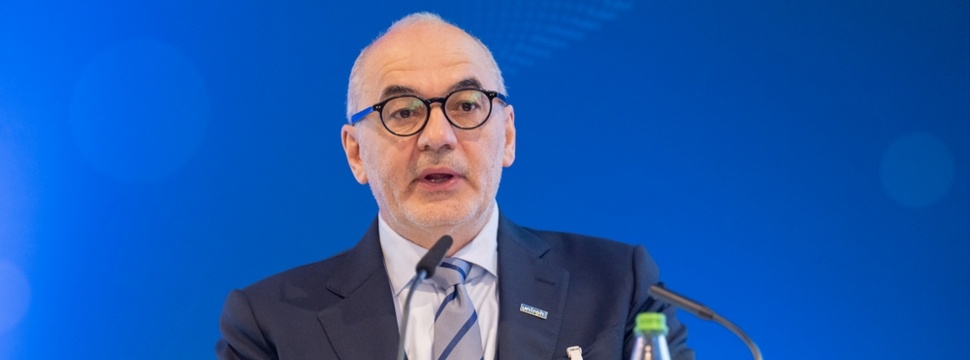Waste paper industry has overcome permanent crisis
News General news
At the 25th International bvse Waste Paper Day in Stuttgart, Werner Steingaß, Chairman of the Paper Recycling Association and Vice President of the bvse Federal Association for Secondary Raw Materials and Waste Disposal, welcomed the more than 500 participants from Germany, Europe, North America and Asia.

In his speech, Werner Steingaß highlighted key issues from the past 12 months and stressed that the recovered paper industry had overcome the three-year permanent crisis.
The Chairman of the Paper Recycling Association explained that the difficulties in the paper industry caused by the economic situation had at times led to a very considerable build-up of inventories. Steingaß: "In this difficult mixed situation, recovered paper exports once again proved to be an indispensable valve. Without this valve of market relief, this crisis could not have been overcome, because we are still a net exporter of recovered paper in Europe amounting to about 6 million tonnes per year."
The bvse vice-president made it clear that exports of qualitatively treated, standardised raw materials from recycling were an indispensable regulator for the functionality of the inner-European markets.
"Clogged markets, as in the last six months, lead to the loss of the value of recovered paper as a commodity without a functioning export, and we cannot afford that. The collection, processing and targeted marketing of recovered paper costs money and this has to be compensated by the value of the commodity. We do not even want to talk about the danger of reduced or even lost sources of income for the municipalities. If we allow clogged markets, even for a short time, to cause the value of the goods to no longer cover the costs, then parts of this valuable raw material, recovered paper, will be lost to the value chain, in some cases irretrievably lost," explained Werner Steingaß.
He pointed out that Germany has the best collection systems with the best quality and that German paper mills can thus boast a top recovered paper use rate of 79 %. In order to maintain all this, the value of recovered paper as a commodity must not be lost, even in difficult times, and this can only be achieved in the long run through a free, functioning world market and not through isolation and demarcation.
The amendment to the EU Waste Shipment Regulation, however, is developing "precisely in this direction" of restriction and obstruction. Steingaß: "You have to let it roll off your tongue. Without distinguishing between qualitatively processed recycling waste on the one hand and untreated waste on the other hand, politics is interfering massively in functioning markets for secondary raw materials. The bvse therefore sees the successful work of the industry massively endangered by the threatened obstruction of free world trade in processed recovered paper."
This makes it all the more important to push the issue of the "end of waste status for recovered paper". Steingaß described it as a top issue in 2023. Waste paper can reach the end of its waste status after meeting certain qualitative criteria. This is already the common legal opinion and implementation in Spain, Italy, France and Wallonia - as well as in Bavaria and North Rhine-Westphalia. In the view of the bvse, it is therefore long overdue for the legislator to recognise this nationwide in Germany.
In his remarks, the bvse vice-president also addressed the EU regulation on packaging and packaging waste, which is currently being discussed in Brussels. The bvse basically welcomes the objectives of this draft, including the strengthening of packaging recycling on the way to more resource protection and sustainability, Steingaß explained.
However, the bvse Paper Recycling Association rejects the general requirement for the mandatory use of reusable packaging.
Werner Steingaß: "The general assumption of an advantage of reusable packaging is not proven. On the contrary, the establishment of necessary take-back systems for PPK packaging would have significantly more negative than positive effects. The successful, highly efficient recycling system of PPK packaging - i.e. recycling instead of reuse - would be permanently damaged and true to the motto: "never change a running system" nothing should be changed in this regard."
The added value of PPK, Steingaß explained in justification of the bvse's stance, is precisely that the fibre content in the already existing recycling systems is used in an ecologically advantageous and efficient way. Especially in the case of PPK, all requirements for reusable solutions are therefore superfluous.
Decarbonisation is also an important issue for the recovered paper industry. With about one billion tonnes of CO2 savings potential, waste paper recycling contributes significantly to international efforts to combat the climate crisis and the political will for "green solutions". "By recycling, we conserve primary resources and thus make our considerable contribution to nature conservation and biodiversity. The recycling industry is part of the solution for more climate protection," noted the bvse Vice President.
He reported that the bvse, together with TÜV Süd, has dedicated itself to the topic of decarbonisation, specifically the visualisation of CO2 reduction in the collection and processing of secondary raw materials such as waste paper. Using a standardised process flow, the CO2 backpack and also CO2 key figures in the collection and reprocessing of waste paper can be determined. "The advantage of this determination is to be able to recognise one's own values and the savings potential and from this also to be able to invest in energy efficiency in a targeted manner. Here, too, it is important to be ahead of the game and not to lag behind. Here, with the support of our members, we want to make our contribution to reducing CO2 emissions," stressed Werner Steingass in conclusion.










